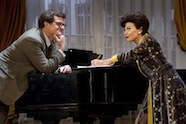Judy Garland Goes Over the Rainbow in Powerful Play about the Show Biz Legend
End of the Rainbow
Belasco Theater
111 W. 44th Street
New York, N.Y.

A few days before I saw Tracie Bennett in End of the Rainbow, the new play about the last days of Judy Garland, I saw Garland, aged fifteen or so, in one of the old Andy Hardy movies on TV. A day later, I saw a clip of her in The Wizard of Oz. I was very ready for the bio-play.
End of the Rainbow, which opened last week, is the sensational story of Garland’s tumultuous series of concerts in London in the winter of 1968, when everything went from bad to worse for the broken star. She tried to right her performing ship with a comebac at the Talk of the Town theater in London, but failed miserably. She's supported by her fiancée, Mickey Deans, and a fictional pianist. She took so many pills in the play that she even swallowed pills she found in the pianist’s attaché case -- prescribed for his dog.
Bennett’s portrayal of Garland is mesmerizing; when the Tony nominations come out, she should be at the top of the list for Best Actress. Not only does she look, sing, and talk like Garland, but she seems to capture every nuance of her very vulnerable personality. She is very funny and at times quite endearing. All of this falls apart, though, as the play spirals towards a very dark conclusion. In the end, she is a wreck, eaten up by booze and pills and yet determined to gain back the limelight.
The play, which comes to New York after a successful opening run at Minneapolis’s Guthrie Theater last year, is a wonderful chapter of show business history. Judy Garland was more than a star; she was a legend. We remember her as Dorothy in The Wizard of Oz, from the Andy Hardy movies, from her later films such as A Star is Born, and her singing and television career. She has as many fans today as when she died of a drug overdose in London at age 47, just six months after the performances featured in the play.
It's very sad to watch Garland fall apart in the play and stagger about the stage drink in hand, balance erratic, eyes unfocused. Her career was in a long downturn when the play begins. She's so broke that the London hotel where she stays demands payment up front. Her fiancé, who is also her manager, gives her money and pays her bills. She goes through her first concert, but barely manages to survive her second. That night she winds up lying on her hotel couch, drunk and loaded up with pills -- even the dog’s pills -- in a tragic portrait of a burnt-out star.
The play is a reminder of the early deaths of so many show business legends throughout history: Janis Joplin, Michael Jackson, and most recently Whitney Houston.
Playwright Peter Quilter does a fine job of capturing Garland in his script. Director Terry Johnson deserves much credit for permitting the other actors on stage to bloom in a show overly dominated by Judy. Johnson keeps the play moving briskly, but takes time out for long moments of Judy’s despair and her fiancé’s frustration.
Johnson gets superb performances from the other performers in the play. Tom Pelphrey is the fiancé, who loves Judy but is irritated by her never-ending irrational behavior. Like the enabler of every addict, it is his job not only to get Judy back on her feet, but clean up her messes. Michael Cumpsty plays Anthony, the loving pianist who has not played with Judy for five years, ever since her bad behavior ruined a concert in Melbourne. Jay Russell plays a variety of roles quite well, too.
The drama also includes a number of Garland hits, including, of course, "Somewhere Over the Rainbow."
The play provides a good luck at the tantalizing life of Garland and her era. The writer and director missed an opportunity, though, to remind the public that she really was a huge star in her time. Though the show doesn’t mention much of her career except the film The Wizard of Oz. Garland starred in dozens of movies, including nine with Mickey Rooney, and Meet Me in St. Louis (where she sang an unforgettable version of "Have Yourself a Merry Little Christmas"). She was nominated for two Oscars for her roles in A Star is Born and Judgment at Nuremberg. In 1999, the American Film institute named her one of the eight top actresses of all time. Judy starred in numerous television specials and in 1963 had her own variety series, The Judy Garland Show. Here, too, she was attempting a comeback as a night club singer in an era when rock and roll music had taken over.
The play is a reminder that Garland, so famous at such a young age, was a mess in her forties. She never earned a lot of money and ran up huge bills wherever she went, constantly trying to maintain her image as a superstar. She continually owed back taxes, several hundred thousand dollars of taxes, to the IRS. Bills went unpaid. She went through five husbands, had two kids -- Liza Minnelli and Lorna Luft -- who went into show biz, too, and a third child, Joey Luft. She was so broke when she died that Frank Sinatra had to pay for her funeral.
What ruined Judy? Alcohol, drugs, bad relationships, lost childhood, pills, a cruel Hollywood system, fickle fans, and an overbearing, relentless press. Everyone in show business faces that, though -- but some flowers are just too delicate.
PRODUCTION: Producers -- Lee Dean, Laurence Myers, Joey Parnes, others, in association with the Guthrie Theater. Sets: William Dudley, Lighting: Christopher Akerlind, Sound: Gareth Owen, Orchestrations: Chris Egan, Musical Arrangements: Gareth Valentine. The play is directed by Terry Johnson.
